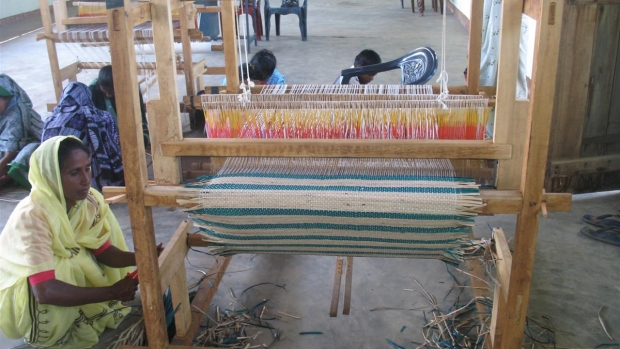Grants :: Small Grant Facilities :: Reviving traditional livelihoods
Reviving traditional livelihoods

Reed-based handicrafts production by fisher ladies, Pottuvil, Sri Lanka © Kumudini Ekaratne, IUCN, 2011, 2011
Objectives
Conserving the traditional knowledge of the area
Background
Traditionally, handicrafts in Sri Lanka have been, and are, cottage industries. Knowledge is handed down from generation to generation and raw materials are usually extracted sustainably from natural resources. It is reported that handicrafts in Sri Lanka have a history of over 2,500 years.
Although making handicrafts is the main livelihood in some villages in the Southern Province, in other areas of the island, it may be losing its appeal as a livelihood.
This project strives to revive a traditional livelihood of weaving mats, bags and other items, using sedges that grow in wetlands.
Sedges are grass-like plants that grow in, or near, static or flowing water. They have underground stems and shoots that grow horizontally above the ground and produce new plants. Because of these underground stems and horizontal shoots, sedges are able to trap and retain mud and water essential for wetlands.
Traditionally, extraction of natural products was carried out sustainably. In the course of reviving an old trade, it was also necessary to ensure that the use of these natural raw materials did not damage the habitats in which they were found, or disrupt their function in the ecosystem. The project design ensures that there is no damage to the environment.
Interventions:
A community-based organization was formed among beneficiaries and was registered.
One thousand plants of the sedge, Cyperus corymbosus, grown in the Grantee's nursery were planted by 20 women of fisher families in their homesteads.
Inititally, fourteen women and eight men fenced in a common plot of 0.2 of a hectare, and then, planted this area with the sedges that were given. The live fences comprised Sappanwood (Caesalpinia sappan), the wood of which yields a natural die.
Twenty members participated in a training programme on weaving, both by hand and using a machine.
Three weaving machines and a flattening roller were donated to the community centre at the end of the training programme.
Target beneficiaries
20 women from fisher families
Outputs
20 women practicing traditional handicraft production with machinery to speed up the process.
Accomplishments and challenges
• These women are now earning 30-37 USD (4-5,000 LKR) per month as additional income, for products made from raw materials from their plots.
• There is a ready market for the products.
Contributions to cross-cutting themes
0.2 ha of land is planted with sedges, thus reducing use of wild sedges.
Lessons Learned
• Through this project, traditional weavers have been introduced to new designs.
• The equipment provided to communities from the project allowed for large quantities to be produced.
Project Facts
Country
Location
Pottuvil
Topic
Duration
1st May 2011 to 31st Jan 2012
MFF Grant Amount
LKR 673,090.00
Implementing Partner
Mr Piyasoma BentotaCommittee for the People's Rights Protection“Gamagedara”Rathnapura Road, Gurugoda, HoranaTel: 94342255771gamagedara@sltnet.lkpiyasomabk@gmail.com
" The project provided us with 3 weaving machines, and these help us in speeding up the handicraft preparation process". Mrs Umma Lebbe